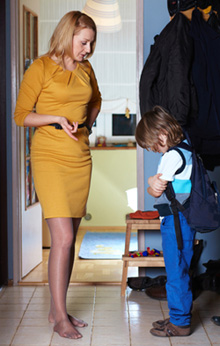4 Keys to Shifting Negative Behavior
Parenting Course Lesson Three

The Third Key
Beyond Behavior

I want you to stop looking at behavior as an indication of whether your child is good or bad and realize that children spend every minute of their day trying out new workable strategies for meeting their needs.
Needs for autonomy, fun, play, exploration, meaning, purpose, connection...
♥ Behavior is a form of communication
and a strategy to meet a basic human need. ♥
Understanding, accepting and recognizing this principle is a vital part of making the shift to conscious parenting and seeing beyond behavior.
95% of human behavior is unconscious.80% communication is non-verbal.
This means that there is A LOT going on without anyone needing to say much
or being quite conscious of what they are doing.
What are your unconscious behaviors saying?
Do you model conscious attuned responses
to stress, disappointment and change?
Explore your past and take charge of your behavior!

Your unconscious, automatic behaviors were formed long ago - by your early experiences and until you do some personal housecleaning - you may be unconsciously operating programs - beliefs, fears and systems of thought - that you inherited long ago!
Belief systems that may not be true for you today, could be unwittingly sabotaging your relationship with your kids by operating in the background, without your full awareness.
More often than not, you are likely unconsciously reacting - instead of responding to and showing your child how to interact in the world with a sense of well-being and calm.
I warned you that this parenting stuff had little to do with children and way more to do with parents! :)
This does not mean that we are to be perfect parents.
Obviously life is not perfect - but how well do you manage stress?
...because your children are receiving crucial messages about behavior every minute by watching you deal with negativity, disappointment and frustration. Conscious parenting asks that you do just that - become conscious of your behavior.
Not perfect, just conscious.One more time - not PERFECT... JUST CONSCIOUS.
Be aware of how your everyday interactions appear
to your children (and others). Are you gruff, short and critical?
Or are you joyful, present and engaged?
Your behavior matters!
(I'm so sorry, but we're the adults with all those fabulous life skills we hope to impart :)
Do you know what question parents ask most?
You might remember it from the first lesson -
How can I change my child's behavior?
The problem with this question is not in its intention. As a parent you want to be able to set limits on unacceptable behavior and guide your children toward making appropriate choices.
But what is behavior?
Behavior is your child's instrument of communication. It is his way of letting you know what he needs.
The core principle behind compassionate communication is that all human behavior is an attempt to meet basic needs. Needs and feelings are the underlying motivations for all behavior.
If behavior is communication - does it make sense
to try and "change the communication?"
No - you must observe behavioral messages, watch for cues, empathize with strong emotions (tantrums and rages) and decipher the messages by being attuned, connected and present with your child.
Behavior is communication
that is driven by
honest intentions and core needs.
Negative behavior is communication from a place of disconnection, stress or fear.
When a child fears that his need is not being met or feels unheard, his behavior is his way of telling you...
You're not listening.You don't understand!
This is what I need.
When a child is dysregulated - his brain is off-line, he feels disconnected from his source of well-being and he may fear that his needs or feelings are being ignored, discounted, judged or misunderstood.
Behavior will continue to escalate until someone steps in to help the child regulate - until he feels validated and connected or until his will has been crushed to the point of submission.
When your priority is to judge and evaluate your child's behavior, you miss an opportunity to teach him about disappointment, change and resilience in a world where things will not always go his way.
You lose out on a chance to communicate, connect and RESPOND.
RESPOND don't REACT!

It takes practice to be mindful of our words and actions, to stay calm and quickly identify needs.
You can learn more tips and techniques with the guided exercises in my audio classes.
I promise you that when you start acknowledging feelings and needs with compassion instead of judgment - negative behavior will diminish.
When your child trusts that you will lead with love and not criticism, he will feel safe enough to retain access to positive behaviors which will enable him to listen to your requests AND be more likely to cooperate.
Children, in their limited capacities, have the urge to satisfy their needs as quickly and as easily as possible and to please us and gain our approval.
This may mean that "lying" when being interrogated by an angry parent, is your child's most efficient route to preservation of the self and his relationship with you.
It may mean that to a toddler, "hitting" seems like a perfectly reasonable way to say "Can I play?" or that grabbing a toy is easier (and faster) than asking for a turn.
♥ Children do not "misbehave" to make us mad.
They react with the best intentions, using the skills
which they have available to them in the moment. ♥
If they feel unheard or if they fear that their relationship with us is in jeopardy, they may lash out or even ignore us, but what they need most is someone to stay connected and caring to help them move through the discomfort.
Discipline should not judge, control, criticize, compare or use guilt or shame to "teach."
If your child becomes loud or violent, consider that he may be having trouble expressing his frustration and is not a "bad kid."
As the parent, you are the "emotion coach," the regulator. You have the ABILITY to meet your needs and HELP your child find better strategies for meeting his.
This ability comes from
understanding and mindfulness.
Not from power.
Children rely on feedback from their environment to adapt their behaviors.
What is the quality of feedback that your child receives from you or others?"
Feedback that negates, dismisses disapproves or controls increases negative behaviors and disconnection. Remember, we show our children how to respond to change and interact with others by the way we treat them and by the way we act.
When your child is having a meltdown... or really mad -
- Don't talk.
- Don't ask questions.
- Don't reason or try to convince him all will be fine.
He CANNOT hear you in this state.
Just be silent.
Be mindful and project love.
Words can come later.
Your silence is a golden opportunity to show compassion and empathy. New appropriate behaviors can ALWAYS be addressed - later.
When brains are back online, AFTER everyone is regulated, after needs have been addressed and feelings have been validated, you can move on to problem-solving and helping your child find better ways to express his feelings.
Regulation is essential to learning.
Children cannot hear, think or remember when they are stressed or fearful.
When you demand compliance - first by threatening a consequence, raising your voice, an eyebrow, or imposing your will without recognizing that there is a very good reason for the behavior you, create resistance in your child.
When you focus solely on behavior or insisting on your demands - you create fear and stress in your child and any guidance or learning you hope to impart will be lost in the flood of stress hormones overtaking your child's brain.
It is far more effective to say to a child...
"It sounds like you are not feeling heard. I'm sorry I didn't listen the way you needed me to."
"Please tell me what you need when you are ready."
"I want to listen now."
"I can see how upsetting this feels to you. I'm going to stay close by to help.
Get more strategies for using connected communication
and practicing stress regulation in my Conscious Communication Course.
Begin to take your child's behavior less personally and you will be able to approach behavior or emotional meltdowns without attachment. You will also be able to connect with your child, practice deep listening, show empathy and strengthen your relationship while shifting negative behavior.
Your child's behavior is not a way to manipulate or control you, but a sincere desire to communicate feelings and needs.
Children do not learn solely by telling them what to do because humans are not behavioral beings.
We are social beings.
We learn through our relationships with others - by interacting with our world - not by watching it or listening to someone else tell us how it is. Children want to feel a sense of dignity and autonomy over their life. Even at the tender age of three.
Next Up... Ever ask your kid, "WHAT WERE YOU THINKING?!"
You might be surprised to find out what's going on inside your child's head! Check your email in a day or so for the final key to shifting negative behavior!
Until next time...
Homework

1. Investigate the need your child might be trying to communicate or meet with his "bad behavior." What is he trying to tell you?
2. Practice seeing the NEED!
3. Observe without judgment and ASK - How can I help my child move through this situation gracefully?
What do you think? I love hearing from you, so leave me a comment below. Share your stories, post your challenges and if you benefited from this article, consider sharing it with a friend!
comments powered by Disqus
This online course and its content is copyright of © Lori Petro, TEACH through Love 2011-2018. All rights reserved. Any redistribution or reproduction of part or all of the contents in any form is prohibited other than the following:
- you may print or share extracts for your personal and non-commercial use only.
- you may copy the content to individual third parties for their personal use, but only if you acknowledge the website as the source of the material with the appropriate links.
You may not, except with express written permission, distribute or commercially exploit the content. Nor may you transmit it or store it in any other website or other form of electronic retrieval system.



